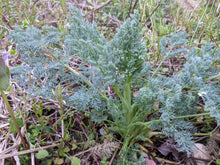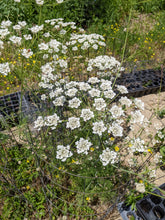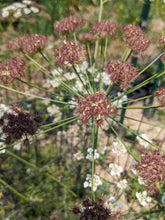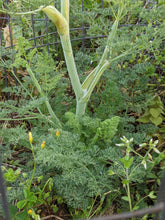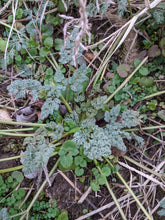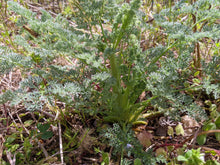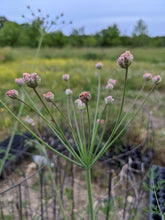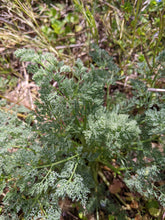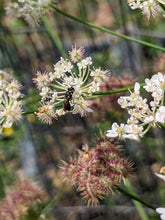"Space Carrot" (Astrodaucus littoralis)
Regular price
$5.00
Sale
Astrodaucus littoralis
Origin: Azerbaijan
Improvement status: Wild
Seeds per packet: ~30
Germination tested 12/2023: 50% (could be higher under better conditions)
Life cycle: Biennial
EFN INTRODUCTION. This plant is very little known outside its native range which extends from Romania and Bulgaria to the Caucasus Mountains, mostly along the northern coast of the Black Sea, including the Crimean Peninsula and the Sea of Azov. The Ukrainian and Russian common names (morkovnitsya pryberezhna and morkovnitsa pribrezhnaya respectively) translate roughly to "coastal carrot," but it has no common name in English. Since the Latin name is Astrodaucus — "astro-" being a Latin prefix referring to outer space, from the Greek word for star, and "daucus" meaning carrot — and there is something decidedly otherworldly about this carrot-relative's appearance, we have been referring to this plant as "space carrot" since we started growing it and we sincerely hope this catches on as its common name (as far as we know, no other seed company in the US has offered its seeds before, so we figure naming it is our prerogative!).
"Space carrot" is a spectacularly lovely carrot cousin with delicately dissected frond-like leaves that are a pale greenish-blue or seafoam-green. Like the carrot, space carrot is a biennial. Unlike the carrot, it's not the root that's widely eaten, but the second year shoots. In its native range, space carrot shoots are a locally popular foraged food that sometimes appears in bundles at markets and can even be found as a canned pickled product on store shelves. The flavor is in the same ballpark as carrot and parsley, but distinct. It's also well worth growing for its flowers alone, which are like an exaggerated version of carrot flowers (the ubiquitous feral form of which is popularly known as "Queen Anne's Lace") — and similarly beloved by native pollinators, including native bees, despite being a non-native plant. We haven't experimented with this plant very much — our initial population, grown from USDA seed originally collected in Azerbaijan, was quite small — but we are optimistic that the flowers will be tasty as well, either as an ingredient in pickles (like dill flowers) or perhaps batter-dipped and fried (like so many other edible flowers). The seeds look like a cross between standard carrot seeds and a millipede, with spiky little protrusions lining the seed's edge. They really do look like little bugs. Given other species in the same family have flavorful edible seeds (including fennel, dill, caraway, anise, cumin, coriander, parsley, etc), we think there's a good chance the seeds have some culinary applications as well.
And while few beyond its native range (besides us!) have come to appreciate space carrot for its culinary and horticultural virtues, its medicinal properties are of interest to researchers in many places. A group of Iranian scientists published a paper in 2021 detailing the potential anticancer capabilities of plants in the Astrodaucus genus, and other scientists have evaluated space carrot or its cousins for myriad positive health impacts, including antioxidant, antidiabetic, and antimicrobial effects. It seems there are two species: an annual called Astrodaucus orientalis (or A. persicus), with a much wider range, and the biennial Astrodaucus littoralis with its more limited range.
Good luck finding a more interesting new plant for your garden than the space carrot!
These seeds were grown by EFN co-founder Nate Kleinman at the EFN flagship farm in Elmer, NJ.
GROWING TIPS: Start indoors a few weeks before last frost. Seed germination is irregular. We surface-sowed these, because others in the family require light to germinate, and it's likely these do too. Once plants reach a few inches in height they can be planted outside. Space at least 1 ft apart. Second year shoots (which will become flower spikes) can be harvested as food, and are best served cooked or pickled.










